|
|
|
Sort Order |
|
|
|
Items / Page
|
|
|
|
|
|
|
| Srl | Item |
| 1 |
ID:
147846
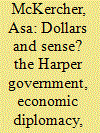

|
|
|
|
|
| Summary/Abstract |
Over its near-decade of governance, Canada’s Conservative government developed an international agenda that narrowly construed international engagement as economic diplomacy. Rooted in the Conservatives’ desire to establish themselves with voters as shrewd stewards of the Canadian economy, economic and commercial calculations took precedence, trumping even military spending and the Arctic, both defining portfolios for Prime Minister Stephen Harper. We demonstrate the economic essence of the Conservative government’s international agenda and examine outcomes related to trade, the extractive resource sector, and the Canada–US relationship. We argue that the dramatic overhaul of Canada’s public diplomacy, strategic and security agendas, and global cooperation initiatives was a result of a limited conception of foreign policy that prioritized economic and commercial objectives. The legacy of economic diplomacy is a renewed focus on the question of international engagement as a means to a Canadian end as a new Liberal government contends with the consequences of economic diplomacy.
|
|
|
|
|
|
|
|
|
|
|
|
|
|
|
|
| 2 |
ID:
187385
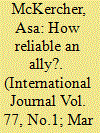

|
|
|
|
|
| Summary/Abstract |
The withdrawal of US forces from Afghanistan, and the subsequent collapse of the Western-backed Afghan government in August 2021, raised doubts in the United States and abroad about the limits and credibility of American power. For some observers, the situation seemed to parallel the fall of the South Vietnamese regime in April 1975. Given the comparisons being drawn between Saigon and Kabul, this brief paper examines a series of Canadian diplomatic reports produced in the wake of the events in South Vietnam. Addressing the question of how reliable the United States was as an ally, the conclusions drawn in these reports should give some pause to doomsaying about US security commitments. Although the contemporary situation differs from that of the mid-1970s, Canadian observers recognized that American power rested on a firm foundation.
|
|
|
|
|
|
|
|
|
|
|
|
|
|
|
|
| 3 |
ID:
159853


|
|
|
|
|
| Summary/Abstract |
Within the literature on human rights, the 1970s are often viewed as a period in which rights achieved a breakthrough globally. While rights regimes, activist networks, and the overall discourse of human rights certainly came into their own during this decade, the rights revolution had its limitations, particularly at the international level. In the Canadian context, the government of Pierre Trudeau advanced a domestic rights program, culminating in the Charter of Rights and Freedoms. In terms of foreign policy, however, Trudeau was far more cautious. Tracing Pierre Trudeau’s stance toward international human rights, this article points to the prime minister’s realist outlook as having delimited the place of rights in Canadian foreign policy during his time in office. Thus, there was little enthusiasm on the part of the Canadian government to support self-determination movements, to impose bilateral sanctions against abhorrent regimes, or to loudly condemn rights violators when doing so would seemingly accomplish little. The point of this paper is not to condemn Trudeau, but rather to understand why Canada’s rights revolution stopped at the water’s edge.
|
|
|
|
|
|
|
|
|
|
|
|
|
|
|
|
| 4 |
ID:
132030
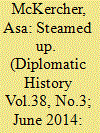

|
|
|
|
|
| Publication |
2014.
|
| Summary/Abstract |
Studies examining the initial response of the United States to Cuba's revolution largely ignore the role of Congress, an oversight reflecting both a scholarly trend emphasizing the actions of the presidency in regards to American foreign policy making and the separation of powers in the U.S. constitution. Redressing the balance, this article examines how members of Congress reacted to the course of U.S.-Cuban relations throughout the crisis years of 1959-1963. Illuminating Cuba's place in domestic debates about foreign affairs it also looks at the politics surrounding the American response to the Cuban revolution. Lawmakers quickly emerged at the forefront of those calling for a strong stance toward Cuba. In turn, congressional pressure to confront Fidel Castro both helped and hindered presidents Dwight Eisenhower and John Kennedy. For Kennedy, in particular, domestic politics and actions by Congress were major concerns that tempered his actions in dealing with the Cuban revolution.
|
|
|
|
|
|
|
|
|
|
|
|
|
|
|
|
| 5 |
ID:
154642
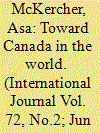

|
|
|
|
|
| Summary/Abstract |
As a field of study, Canadian Foreign Policy history has been on life support for the better part of three decades. While its resiliency speaks to the commitment of its practitioners, the fact that Canadian international history has largely been sidelined is troubling given both the field’s importance generally and its appeal to undergraduate students and the wider public. Yet, at the same time as Canadian Foreign Policy history has been in stasis, a new field examining Canadian interactions with the world through transnational and cultural lenses has arisen. As the apocryphal Chinese proverb puts it, this situation presents both danger and opportunity for Canadian international history. In this article I explore how Canadian international historians might seize the initiative by crafting a new, expansive field of study—Canada in the World—which preserves the study of Canadian Foreign Policy while incorporating other analytical approaches.
|
|
|
|
|
|
|
|
|
|
|
|
|
|
|
|
| 6 |
ID:
134581
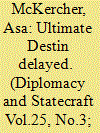

|
|
|
|
|
| Summary/Abstract |
Until Canada joined in 1990, the issue of its membership in the Organisation of American States bedevilled Canadian foreign policy, which many observers saw as a decisive test of Ottawa’s interest in Latin America. Under the Liberal government of Lester Pearson, prime minister from 1963 to 1968, and the stewardship of his secretary of state for External Affairs, Paul Martin, Canada seemed poised to join OAS. But a mixture of foreign and domestic factors—including American intervention in the Dominican Republic, Cuba’s isolation within the hemisphere, and growing Canadian nationalism—ruined this initiative. Using the Pearson government’s policy toward the OAS as a lens through which to explore the direction of Canadian foreign relations in the 1960s, this analysis also examines competing views of Canada’s place in the world.
|
|
|
|
|
|
|
|
|
|
|
|
|
|
|
|
| 7 |
ID:
178192


|
|
|
|
|
| Summary/Abstract |
Drawing on newspaper and archival sources, this article examines post-war Canadian attitudes towards Dwight D. Eisenhower, particularly during his time in office as the United States President from 1953 to 1961. Eisenhower emerged from the Second World War as a trusted figure for many Canadians due to his inspiring leadership of the Allied cause. Once in the White House, however, his reputation began to suffer, and public opinion in Canada increasingly questioned core elements of the traditional Canada–United States relationship and America's ability to lead the Western alliance during a period of heightening Cold War tensions.
|
|
|
|
|
|
|
|
|
|
|
|
|
|
|
|
|
|
|
|
|